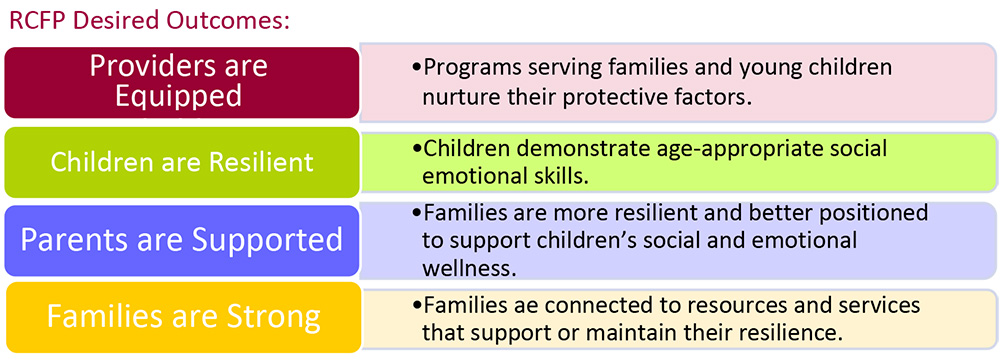
HOW IT WORKS
Organizations selected to participate in RCFP are assigned an RCFP coach. RCFP coaches are early childhood or mental health professionals trained in social emotional wellness, child development, early learning, family engagement and trauma-informed practices.

RCFP is delivered through a 3-phased process that introduces concepts, develops skills, and builds mastery.
Introduction Phase
The introduction phase provides foundational coaching and training focused on resilience, protective factors, and engaging families. During this phase, coaches work with program leadership to identify the capacity for promoting protective factors. Assessments such as the Strengthening Families Self-Assessment, Devereux Early Childhood Assessment, and Family Wellness surveys are used to set the direction of coaching and action planning strategies. Organizations that complete this phase:
- demonstrate increased awareness of impacts of stress and how to promote resilience and engage families through protective factors, and
- develop action plans for continuing these efforts.
Demonstration Phase
The demonstration phase provides skill building focused on responding to stress and promoting social emotional wellness. It is during this phase that on-site observations and consultations occur. RCFP coaches observe services delivered to children and families; followed by a consultation session with both leadership and staff to discuss the coach’s observations, implementation of new strategies/practices, etc. Observations and consultations occur twice a month. Assessments such as the Strengthening Families Self-Assessment, Devereux Early Childhood Assessment, and Family Wellness screens continue to be used. Organizations that complete this phase:
- increase their ability to respond to the social and emotional needs of children and families, and
- develop use of social and emotional assessments in creating individualized learning plans.
Integration Phase
The integration phase provides targeted training focused on addressing complex needs of children and families through trauma informed practices. Observations and consultations occur twice a month. All the assessments collected in the demonstration phase continue to be collected. After participating in a specialized training, the program uses Motivational Interviewing strategies to engage parents who indicate possible trauma and/or toxic stress. At the end of this phase, the coach and organization leadership create a plan for sustaining the RCFP work without ongoing coaching. Organizations that complete this phase:
- increase their knowledge of family needs and community resources, and
- have an updated action plan and experienced staff that strengthens likelihood of sustaining acquired skills and practices.


Working with the Resilient Children and Families Program has made a difference for our children, families and staff. The observations of our work with children and families provides a high level of support in the development of children and engagement with our families. As a director, I am grateful for the guidance and resources provided to our entire center. The benefits of promoting social and emotional development expand beyond our classrooms into the homes and communities of our students.